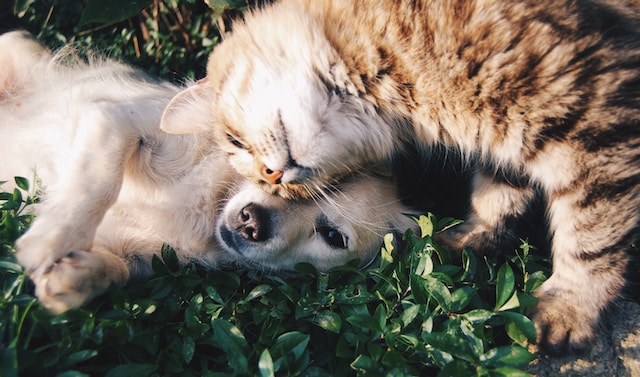Saying goodbye to a furry family member leaves an ache in the heart like no other. These four-legged companions offer love beyond words, making their loss a deeply emotional journey. Grieving pet loss can be overwhelming, but fear not, for therapy offers a lifeline of support and healing. In this blog, we delve into the emotional impact of pet loss and how therapy can mend your wounded heart. Discover the path to healing and find solace amidst the sorrow as we journey together, embracing cherished memories and celebrating the love that forever lives in our hearts.
The Bond Between Humans and Their Furkids
In the symphony of life, the bond with our pets strikes a soulful chord. Their unconditional love, unwavering loyalty, and sweet companionship bless our lives in boundless ways. As pillars of comfort and emotional support, their presence brings solace during the toughest times. When we bid them farewell, a profound loss similar to parting with family tugs at our hearts.
The Grieving Process After Pet Loss
The grieving process after losing a pet can vary significantly from person to person. Some may experience immediate feelings of sadness and loss, while others might initially try to suppress their emotions. Grief may manifest as shock, denial, anger, guilt, or even depression. For some, the loss of a furbaby can trigger memories of past losses, compounding the grief further. Each person’s journey through grief is unique and deserves the utmost respect without judgment.
Recognizing the Need for Support
In the wake of pet loss, individuals may find themselves struggling to cope with their emotions, feeling overwhelmed by grief and unable to move forward. This is entirely normal, and seeking support during this time is essential. Friends and family can offer comfort, but sometimes, the grief can be so intense that professional assistance is required. This is where therapy can be invaluable.
The Role of Therapy in Pet Loss Healing
Therapy can be an invaluable resource during the grieving process after losing a pet. Here are some ways in which therapy can help:
Providing a Safe Space for Expression: In the sanctuary of therapy, let your emotions flow freely, unburdened by judgment or restraint. Together, we create a safe haven where you can pour out your feelings of loss and sadness without hesitation. As you open your heart, the healing begins, and the weight of grief gradually lifts. This therapeutic expression becomes the bridge to your recovery.
Validating Emotions: Together, we navigate the maze of sorrow, where feeling understood. No longer burdened by the weight of unspoken pain, you find comfort in the knowledge that your grief is seen and acknowledged. Your emotions are not just heard but honored, and your heart finds the healing it so deserves.
Understanding the Grieving Process: The grieving process after pet loss can feel both confusing and overwhelming. I help you understand the stages of grief you are experiencing and offer insights into your emotions. This knowledge can offer reassurance and reduce feelings of isolation.
Coping Strategies: Adjusting to a life without your beloved companion can feel like uncharted territory. Tailoring coping strategies to your unique needs, we’ll navigate grief’s twists and turns, helping you find strength amidst the void.
Addressing Complicated Grief: In some cases, pet loss grief can be complicated by unresolved issues or previous losses. Therapy can help you work through these underlying factors, enabling you to process grief more effectively.
Finding Meaningful Ways to Honor Your Pet’s Memory: Therapy can assist in finding meaningful ways to honor your pet’s memory, such as creating a memorial or engaging in activities that celebrate the positive impact your amazing fur baby had on your life.
Providing Closure: Sometimes, individuals may have unresolved feelings or regrets related to their pet’s passing. Therapy can facilitate the process of finding closure and acceptance, enabling you to move forward with more peace in your life.

7 Tips for Coping with Pet Loss
While therapy can be immensely beneficial, here are some additional tips to help cope with pet loss:
- Allow Yourself to Grieve: Give yourself permission to feel the pain of loss is a huge step. It’s natural to experience a wide range of emotions, and it’s okay to grieve in your own time and way.
- Reach Out for Support: Lean on friends, family, or online support groups who understand the depth of your loss. Sharing your feelings with others who have experienced pet loss can be comforting.
- Create a Tribute: Consider creating a memorial or keepsake in honor of your pet. This act can be a meaningful way to remember the joy and love they brought into your life.
- Express Yourself: Write about your feelings or create art as a form of expression. These creative outlets can be therapeutic and help you process your emotions.
- Establish a Routine: Establishing a daily routine can provide a sense of stability and comfort during a difficult time.
- Take Care of Yourself: Practice self-care by getting enough rest, eating well, and engaging in activities that bring you joy and relaxation.
- Online Pet Loss Support Groups: These groups provide a platform for pet owners to connect with others who have experienced similar losses. Sharing stories, memories, and feelings in a supportive community can offer immense comfort and validation.
7 Tips for Coping with Pet Loss
While therapy can be immensely beneficial, here are some additional tips to help cope with pet loss:
- Allow Yourself to Grieve: Give yourself permission to feel the pain of loss is a huge step. It’s
natural to experience a wide range of emotions, and it’s okay to grieve in your own time and
way. - Reach Out for Support: Lean on friends, family, or online support groups who understand the
depth of your loss. Sharing your feelings with others who have experienced pet loss can be
comforting. - Create a Tribute: Consider creating a memorial or keepsake in honor of your pet. This act can be
a meaningful way to remember the joy and love they brought into your life. - Express Yourself: Write about your feelings or create art as a form of expression. These creative
outlets can be therapeutic and help you process your emotions. - Establish a Routine: Establishing a daily routine can provide a sense of stability and comfort
during a difficult time. - Take Care of Yourself: Practice self-care by getting enough rest, eating well, and engaging in
activities that bring you joy and relaxation. - Online Pet Loss Support Groups: These groups provide a platform for pet owners to connect
with others who have experienced similar losses. Sharing stories, memories, and feelings in a
supportive community can offer immense comfort and validation.
Losing a pet is a gut-wrenching experience that can leave deep emotional scars. During this challenging time, seeking therapy can be a crucial step towards healing and finding peace during this challenging journey. I offer a safe space to express emotions, validate feelings, and understand the grieving process on a deep personal level. Remember, it is entirely normal to grieve the loss of a beloved pet deeply, and seeking professional help is not a sign of weakness but an act of self-compassion and strength. Through therapy and support, you can find comfort, coping strategies, healing, and a renewed sense of hope as you navigate the journey of pet loss. Additionally, incorporating coping strategies and honoring your pet’s memory can help you navigate this difficult time. Remember that pet loss is a natural part of life, and with support and time, healing can occur, leaving cherished memories that will forever remain in your heart.
“Our animal friends teach us more than we could have expected and love us more than we could have hoped… that’s why we miss them more than we could have imagined.” Unknown

